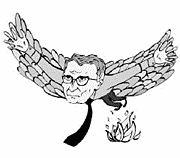This week, demonstrators gather in Los Angeles to protest the Democratic National Convention and the coronation of Al Gore. Protesters come with myriad issues, which all boil down to a fundamental critique of Tweedledum and Tweedledee: There is no basic difference between the two wings of our ruling corporate party. They’re right.
Of Gorebot, the best that can be said is that at least nobody has ever accused him of being a serial rapist. In almost every other respect, he is a worse choice for president than his mentor, Bill “Corporate Toady” Clinton. Clinton, mind you, is the moderate Republican who in the last eight years stacked the federal bench with yet another generation of conservative judges; abolished welfare and reinstated the federal death penalty; increased military spending after the end of the Cold War; was at the very least indirectly responsible for genocides in Rwanda and Iraq (as well as unspeakable war crimes against Yugoslavia and indirect crimes against the usual roster of Third World peasants in places such as Indonesia and Colombia); implemented and oversaw economic policies that dramatically increased the gap between the rich and poor at home and abroad; pushed through NAFTA and supports the WTO; and, well, the list is damn near endless.
Gore was there for all of it. And as for the preposterous assertion that Gore will somehow be good for the environment, a brief reality check: Al—the guy who holds extensive stock in Occidental Petroleum—has been a point person for US foot-dragging on global warming prevention and a host of other international environmental protection agreements. Under Clinton and Gore, we’ve seen the Arctic opened up for oil exploration (and Alaska oil previously unavailable sold off to foreign bidders for pennies on the dollar); we’ve seen no action on the abominable leasing of mineral rights through an antiquated 1872 law Clinton promised to reform in 1992; and, of course,we witnessed the infamous salvage logging rider.
Archdruid David Broder, the octogenarian enviro now backing a coalition called Environmentalists Against Gore, considers the Clinton/Gore administration the most environmentally destructive of the century—worse than James Watts’ Reagan regime. So much for “Earth in the Balance.”
George W. “Shrub” is, of course, arguably worse. But on a host of issues, they are indistinguishable, and since there is no difference between them there will be no discussion of those issues in the campaign. For those few social issues on which Gore is better (e.g., legal access to abortion), a counterbalancing problem exists—when a Gore administration does something heinous, there will be no built-in opposition.
Clinton was able to accomplish so many of Reagan’s wet dreams because liberal opposition was muted by his Democrat label. With Gore, it will be no better.
Lesser evil’s nadir
All this is why a vote for Al Gore is a wasted vote: a vote for the lesser evil who still supports a deeply corrupt two-party system. This year, there is somewhere else to go, and that has Gore backers quite worried. On the West Coast, the Ralph Nader campaign is polling near 10 percent, and in Washington state that comes with virtually no campaign in place as of yet. Our state could easily be Nader’s top vote-getting state by percentage and that in turn could cost Gore the state.
Nader is not perfect. But he’s a damn sight better than Gorebot and Shrub combined. More importantly, backing Nader is this year’s best chance—after the sad, Buchananite implosion of the Reform Party—for a viable, competitive third party in the United States. The Green Party is often doctrinaire, wildly unorganized, and tends to attract the naive and, well, a few flakes. But it is also the country’s best hope for a principled political party somewhere to the left of compassionate conservatism. Furthermore, Nader is giving the Greens an excellent shot at future ballot qualification, federal matching funds, and a generation of enthused young volunteers in states across the country.
But those aren’t the Greens’ only goals. “I personally think we can take the state,” says Melissa Roberts, an organizer for the Washington state Green Party. She doesn’t offer much in the way of justification for her hope—the Greens will be hopelessly outspent and won’t have other candidates further down the ballot to buttress Nader in most of the state. (Joe Swzaja, a Green candidate against inert Congressman Jim McDermott, is on the ballot in Seattle.) But it’s exactly that sort of grassroots determination that made Perot possible in 1992.
At a minimum, Roberts’ and other activists zeal makes Nader a viable candidate, and one who ought to be included in the presidential debates—if for no other reason than that he’d whip Gorebot and Shrub’s asses. (Precisely the reason he’s being excluded.)
If nothing else, a vote for Nader is an assertion that money should not be the deciding factor in American politics. For the last two years, both Gorebot and Shrub have crisscrossed the nation’s board rooms, shaking down corporate CEOs in exchange for future favors at the expense of ordinary citizens. Both candidates had their parties’ nominations sewn up, and thus were guaranteed that one of them would be the next president, long before a single vote was cast. This perverse, “one dollar one vote” system is what’s left of representative democracy in our country, and the only way we can try to ensure that it’s better in coming years is to support candidates this year who can build a future alternative.
In this season of despair in Los Angeles, we do have a choice. To volunteer for the Nader campaign, or to find out more about why he’s so much better, call 329-6932 or check out www.wagreens.org.







